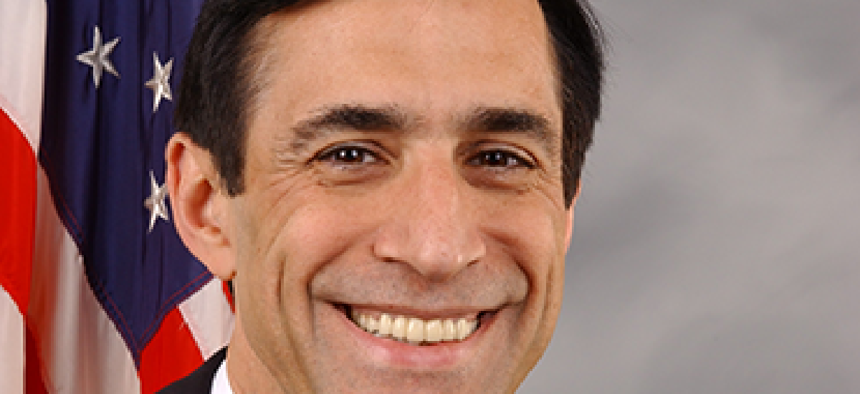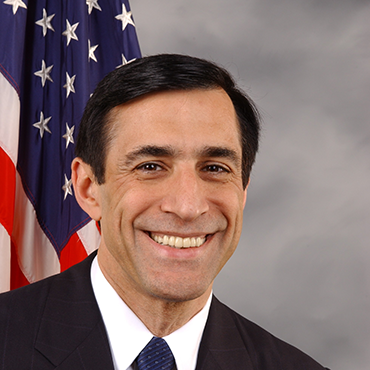Industry nervous about SUSPEND Act

Bill to centralize the process for suspending or debarring contractors unneeded, could create new problems, critics warn.

Rep. Darrell Issa's SUSPEND Act, to reform the suspension and debarment process, is not needed and could create new problems, critics say. (File photo)
A bill that would change the process for suspending or debarring contractors is already raising concerns, as shown by a gathering of industry and federal officials at George Washington University's law school on July 12, organized by TechAmerica and the university's Government Procurement Law Program.
The July 12 event, intended as a sounding board for all stakeholders that might be affected by the legislation, drew federal contracting companies, lawmakers and agency managers -- more than 100 attendees in all.
House Oversight Chairman Rep. Darrell Issa's (R-Calif.) Stop Unworthy Spending (SUSPEND) Act would consolidate the suspension and debarment programs for dozens of civilian agencies into a centralized review board, called the Board of Civilian Suspension and Debarment, inside the General Services Administration.
The new board would manage the process by which contractors alleged to have engaged in misconduct or poor performance are declared ineligible for more government business. The Defense Department was not included in the draft.
When Issa unveiled the draft in February, a posting on his website said it was designed to ensure "zero tolerance for fraudsters, criminals, or tax cheats receiving taxpayer money through grants or contracts." The congressman contends the bill would give a faster, more effective response to contractor fraud.
The board proposed in the bill would work with the Interagency Suspension and Debarment Committee (ISDC), a body created by executive order in 1986 that provides agencies with suspension and debarment rules of the road. Under the SUSPEND act, a single person would chair the two bodies, and the new board would be responsible for making sure databases on debarred and suspended entities were complete and up to date. The bill would phase out individual agency suspension and debarment offices by the end of fiscal year 2013.
Trey Hodgkins, senior vice president of the global public sector at TechAmerica and panelist at the event, said that one of industry's primary worries about the legislation is that it would elevate what should be a business process to a semi-judicial level, potentially harming businesses in the process.
Individual agencies, each with different procedures, currently handle vendor debarment and suspension. Agencies generally use the processes due to questionable vendor conduct, but their assessments do not directly affect a vendor's status with other government customers. Creating a the new board, which would have ultimate say over most agencies' vendor debarments and suspensions, could potentially tar a company unfairly with unproven allegations, said opponents.
Hodgkins contended that there already are effective and robust debarment and suspension enforcement at some agencies. Efforts would be better spent harmonizing the processes among agencies, as well as bolstering and expanding existing successful agency programs, he said.
Whether there is even a need for reform at federal agencies is a point of contention, noted panelists. Issa's bill is based in part on the sense that agencies do not use the suspension or debarment processes very often, but the data that led to that conclusion was gathered in the mid-2000s, they said. Opponents of the measure said agencies have become much more proactive since then, beefing up full- and part-time staffing to handle the actions.
A senior staffer from the House Oversight and Government Reform Committee told FCW that he was struck by the divergence of opinions at the meeting on exactly how urgent the need for reform is. He said the committee would look into gathering more-recent data and consider how to incorporate existing agency efforts into the bill, as well as continue to consult stakeholders.
Nevertheless, the aide said, there are enough examples of egregious behavior by vendors to anger Congress and the public. News reports about felons who get repeated government contracts and federal contractors who overcharge by vast amounts have resulted in a kind of ad-hoc suspension and debarment program in Congress. The resulting shower of "one-off" suspensions are a poor way to make policy, said the staffer.
He conceded, however, that determining whether the system is broken enough to demand a legislative remedy is a tough thing. "We need to gather facts," he said.
NEXT STORY: The ripple effect of furloughs


